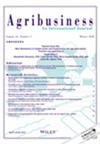印度东部的小麦种子运送途径和品种更替
IF 2
3区 经济学
Q2 AGRICULTURAL ECONOMICS & POLICY
引用次数: 0
摘要
为什么某些农作物新品种在田间科学试验和农场示范中被证明具有优越性,但却得不到农民的欢迎?农业经济学中的微观经验研究通常从家庭或农民的角度来探讨这个问题,而忽视了品种传播所处的更广泛的社会制度和经济背景。在本研究中,我们利用印度东部农民田间的数据,探讨了小麦种子交付网络与品种更替之间的关系。我们对比哈尔邦 31 个县和北方邦东部 9 个县的 7648 名小麦种植户进行了广泛调查,以了解他们的小麦生产实践。额外的定性访谈得出的初步印象是,农民对品种的选择往往先于他们对种子来源的选择,这对有关这种关系因果方向的普遍假设提出了挑战。为了解决品种选择与种子来源偏好之间的反向因果关系这一难题,我们采用了工具变量回归框架。虽然市场上有小麦新品种,但绝大多数农民还是选择老品种。农民在选择小麦品种和种子来源方面的决策并不简单,他们对小麦品种的偏好极大地影响了他们对种子来源的选择,这表明这是一种迄今为止尚未探索过的双向关系。了解这种复杂的关系对种子供应系统的利益相关者具有重要的战略意义,可为提高品种周转率和鼓励小农广泛采用改良新品种提供政策建议。这些举措有望增强发展中国家的系统复原力和粮食安全。[经济学引文:O3、Q1、Q16、Q18]。本文章由计算机程序翻译,如有差异,请以英文原文为准。
Wheat seed delivery pathways and varietal turnover in eastern India
Why do certain new crop varieties fail to gain popularity among farmers despite their proven superiority in scientific field trials and on‐farm demonstrations? Empirical microlevel studies in agricultural economics usually address this question from a household or farmer perspective, neglecting the broader socio‐institutional and economic context against which varietal dissemination takes place. In the present study, we explore the relationship between wheat seed delivery networks and varietal turnover, using data from farmers' fields in eastern India. An extensive survey encompassing 7648 wheat farmers was conducted to capture wheat production practices across 31 districts of Bihar and 9 districts of eastern Uttar Pradesh. Additional qualitative interviews led to the initial impression that farmers' selection of varieties often precedes their choice of seed source, challenging the prevailing assumptions about the causal direction of this relationship. To address the challenge of reverse causality between varietal selection and seed source preference, we employed an instrumental variable regression framework. Although new wheat varieties are available in the market, a substantial majority of farmers opt for old ones. Farmers' decisions regarding the selection of wheat varieties and seed sources are not straightforward, and their preference for wheat varieties significantly impacts their seed source selection, indicating a hitherto unexplored bidirectional relationship. Understanding this complex relationship has significant strategic implications for stakeholders in the seed supply system, offering policy recommendations for enhancing varietal turnover rates and encouraging the widespread adoption of new, improved varieties among smallholders. Such initiatives hold the promise of enhancing system resilience and food security in developing countries. [EconLit Citations: O3, Q1, Q16, Q18].
求助全文
通过发布文献求助,成功后即可免费获取论文全文。
去求助
来源期刊

Agribusiness
农林科学-食品科技
CiteScore
5.50
自引率
6.20%
发文量
58
审稿时长
6 months
期刊介绍:
Agribusiness: An International Journal publishes research that improves our understanding of how food systems work, how they are evolving, and how public and/or private actions affect the performance of the global agro-industrial complex. The journal focuses on the application of economic analysis to the organization and performance of firms and markets in industrial food systems. Subject matter areas include supply and demand analysis, industrial organization analysis, price and trade analysis, marketing, finance, and public policy analysis. International, cross-country comparative, and within-country studies are welcome. To facilitate research the journal’s Forum section, on an intermittent basis, offers commentary and reports on business policy issues.
 求助内容:
求助内容: 应助结果提醒方式:
应助结果提醒方式:


